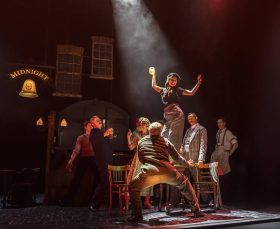Life as a musician: creatively satisfying but itinerant, underpaid and only lucrative for the lucky few?
That’s certainly the cliché we all know. But some have managed to turn that cliché on its head.
As a city renowned for showcasing the best musical theatre in the world, London boasts a small but successful pool of Musical Directors – those brave and hardy souls who direct teams of talented musicians through seasons and seasons of musicals.
They might not be as well known as theatre directors, the musicians or the actors they direct, but Musical Directors play an integral part in countless shows. For many the role of Musical Director is a logical progression from musician – a role with that combines responsibility and huge creative potential.
This appeal, combined with a small supply of jobs makes competition for Musical Directorships tough.
Musical Director, John Maher, who began his career over 15 years ago and whose credits include The Rocky Horror Picture Show, Rent and We Will Rock You is one such person.
Currently working on the Motown hit, Dancing in the Streets, playing in London as well as the UK tour of Thriller Live, John gave Arts Hub an insight into what life as a Musical Director is like.
Unlike many, John became a Musical Director almost accidentally. He had aspirations of being a musician as a teenager. After studying at the Conservatorium of Music in Sydney, and playing in a rock band, he graduated only to find work as an actor – not a musician.
“I had the acting bug as well,” John says. “But it became apparent pretty quickly that there were others whose acting skills were wildly better.”
He continued to find work as an actor – including a season as Riff Raff’s understudy in the Rocky Horror Picture Show. The following season he was promoted – he took on the role of Musical Director.
“Clearly,” John jokes, “someone saw my acting skills and yelled, ‘Get that man off stage’!”
What followed was a steady stream of work and a growing list of credits in Australia: Rent, The Rocky Horror Picture Show and The Return of the Forbidden Planet to name a few. Since moving to the UK five years ago, John has barely had time to stop and now finds himself often running two shows at the same time.
And it’s from the last five years that John pulls his career highlight. “It was in the lead-up to Iraq war. Protests were being staged and I was asked to MD a performance at one of the protest concerts. We pulled a choir together from all over the West End and played at the Theatre Royal. I walked onto stage, took up position at the piano and the actors soon followed. Those who weren’t perhaps as confident with singing stood close to me. At one point I remember looking up and seeing Sir Ian McKellen and Dame Judi Dench standing close and taking the cues from me.”
John jokes, “It was amazing. I remember calling my father and telling him: I’ve really made it – I just directed Gandolph and the Queen!”
So just what is the daily life of a Musical Director like?
“Nocturnal,” John says. Typically, John will spend the afternoon rehearsing. It’s a 6 night a week job with what John terms his, “Sacred Sunday” his only day off.
Rehearsing, John suggests, is in fact his favourite part of the job. “It’s the place where you get to sculpt sometimes as many as 30 or 40 voices in a choral group. Each performer usually has a wildly different approach to the next performer, often with different ideas on what is right and what isn’t. It’s a huge creative challenge.”
John continues, “We rehearse throughout a season. You get performers to listen to how they sounded on stage. It’s an editing process.”
Is it a struggle to keep performances fresh over a long season?
“Shows are always organic,” John says. “And you have to keep a check on it. One, you have to ensure you’re still telling the story in the best way. Two, you have to ensure you don’t straitjacket the performers. Three, you have to keep the actors listening to each other – so they can convince the audience they are singing spontaneously – as though it was the very first time.”
Though John’s path into Musical Directing was slightly skewed, he has advice for musicians wanting to make a career, not a hobby out of music. “Well, you can take the path I took – get yourself pushed offstage and down into the pit. Or you could try some amateur theatre – but don’t get stuck there. Traditionally, MDs are pianists, so you’ll find that many of them started in the pit and worked their way up.”
John suggests that courses for Musical Directing are few and far between but does recommend the Royal Academy of Music. “They take 30 singing students every year along with two Musical Directing students. It’s a great training ground – you get to learn a lot about voice because you work so closely with the other students. Plus there are huge networking opportunities with some of the associated heavyweight MDs.”
Ultimately, it seems, its a job that requires passion and John demonstrates that – and stamina – in abundance. Prior to our interview John had just performed Thriller Live in Glasgow, then driven to Nottingham, performed there, then driven to London.
But rest is for the old according to John. When asked what he was going to do on his rare day off, John enthusiastically replied, “I’m going to pop my head in and see the crew at Dancing in the Streets to say hi.”




